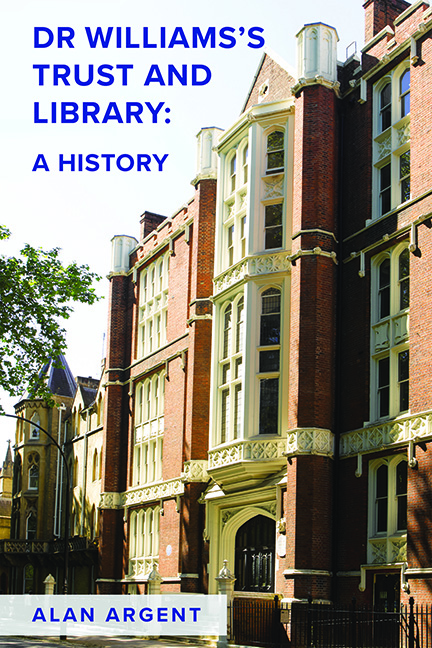Book contents
- Frontmatter
- Dedication
- Contents
- List of Illustrations
- Foreword
- Preface
- Abbreviations
- Notes on Dates, Money, Welsh Place Names and Publications
- Prologue
- 1 Dr Williams and His Will
- 2 Benjamin Sheppard, Receiver 1721–31: Faith, Fitness, and Diligence
- 3 Constructing the Library Building 1725–30: A Proper Plan
- 4 Francis Barkstead, Receiver 1731–47: Piety and Charity
- 5 John Cooper, Receiver 1748–62: Liberty and Liberal Dissent
- 6 Richard Jupp junior, Receiver 1762–95: A Very Respectable Body
- 7 Richard Webb Jupp, Receiver 1795–1850, and David Davison, Receiver 1850–7: Fashionable Sympathies Amid Increasing Light
- 8 Walter D. Jeremy, Receiver 1857–93: The Scrupulous Observer
- 9 Francis H. Jones, Secretary and Librarian 1886–1914: Introducing Order
- 10 Robert Travers Herford, Secretary and Librarian 1914–25: Application and Imagination
- 11 Stephen Kay Jones, Librarian 1925–46, and Joseph Worthington, Secretary 1925–44: A New Age with Old Strains
- 12 Roger Thomas, Secretary 1944–66 and Librarian 1946–66: Trusted Innovator
- 13 Kenneth Twinn, Secretary and Librarian 1966–76: Modest Dependability
- 14 John Creasey, Librarian, and James McClelland, Secretary, 1977–98: Mixed Blessings
- 15 David Wykes, Director 1998–2021: Past, Present, and Future
- 16 Dr Williams’s Trust: An Assessment
- Appendix 1 Trustees in 1723
- Appendix 2 Lists from Short Account (with later additions)
- Bibliography
- Index
11 - Stephen Kay Jones, Librarian 1925–46, and Joseph Worthington, Secretary 1925–44: A New Age with Old Strains
Published online by Cambridge University Press: 26 May 2022
- Frontmatter
- Dedication
- Contents
- List of Illustrations
- Foreword
- Preface
- Abbreviations
- Notes on Dates, Money, Welsh Place Names and Publications
- Prologue
- 1 Dr Williams and His Will
- 2 Benjamin Sheppard, Receiver 1721–31: Faith, Fitness, and Diligence
- 3 Constructing the Library Building 1725–30: A Proper Plan
- 4 Francis Barkstead, Receiver 1731–47: Piety and Charity
- 5 John Cooper, Receiver 1748–62: Liberty and Liberal Dissent
- 6 Richard Jupp junior, Receiver 1762–95: A Very Respectable Body
- 7 Richard Webb Jupp, Receiver 1795–1850, and David Davison, Receiver 1850–7: Fashionable Sympathies Amid Increasing Light
- 8 Walter D. Jeremy, Receiver 1857–93: The Scrupulous Observer
- 9 Francis H. Jones, Secretary and Librarian 1886–1914: Introducing Order
- 10 Robert Travers Herford, Secretary and Librarian 1914–25: Application and Imagination
- 11 Stephen Kay Jones, Librarian 1925–46, and Joseph Worthington, Secretary 1925–44: A New Age with Old Strains
- 12 Roger Thomas, Secretary 1944–66 and Librarian 1946–66: Trusted Innovator
- 13 Kenneth Twinn, Secretary and Librarian 1966–76: Modest Dependability
- 14 John Creasey, Librarian, and James McClelland, Secretary, 1977–98: Mixed Blessings
- 15 David Wykes, Director 1998–2021: Past, Present, and Future
- 16 Dr Williams’s Trust: An Assessment
- Appendix 1 Trustees in 1723
- Appendix 2 Lists from Short Account (with later additions)
- Bibliography
- Index
Summary
The years 1925–46 saw some modernising – with improved electricity and an electric lift. Stephen Kay Jones embodied the finest Unitarian love for DWL, its traditions, and its readers. Yet he understood the need for change and, in this, was probably frustrated by World War Two. The interests of librarian and secretary sometimes conflicted. Was that merely a clash of personalities or did it reflect a more deep-seated quarrel between the trust and the library?
The Librarian, Secretary, and University Hall
In March 1925, the trustees promoted the sub-librarian Stephen Kay Jones (1880–1961) to the office of librarian, with effect from October, having responsibility for ‘the management and control of the Library, and its staff’ and also to ‘act as clerk to the book committee’. His salary was £300 a year, with rent and tax free the two upper floors, which rooms he might let, if he chose not to occupy them himself. Two ministers and one layman were mooted as possible candidates for the secretary's post, with the motion that only ministers should be considered being narrowly lost. In June, Revd Joseph Worthington (1877–1944) became secretary of DWT, with effect from October, to take charge of its educational, charitable, and administrative work.
The trustees, assured that the proposed agreement with UCL was in DWT's interests, agreed in March 1927 to let the north wing and annexe, the former for ten years and the latter for ninety-nine years, determinable on either side after fifty years, from 1928. On learning that ‘the historical memorandum’ on University Hall would be published in The Transactions of the Unitarian Historical Society, the trustees decided to buy 250 off-prints of the work by William Tarrant and Joseph Worthington. The secretary of the Presbyterian Board was reminded in 1928 that nobody, other than trustees, was entitled to meet at DWL, and that permission must be granted if the Presbyterian Board wished to hold meetings there.
Throughout the 1920s and 1930s repairs and improvements were made to the building. New windows were placed in the galleries of the reading room in 1926 and portraits were rehung in the corridor and on the north stairs.
- Type
- Chapter
- Information
- Dr Williams's Trust and Library , pp. 206 - 218Publisher: Boydell & BrewerPrint publication year: 2022



